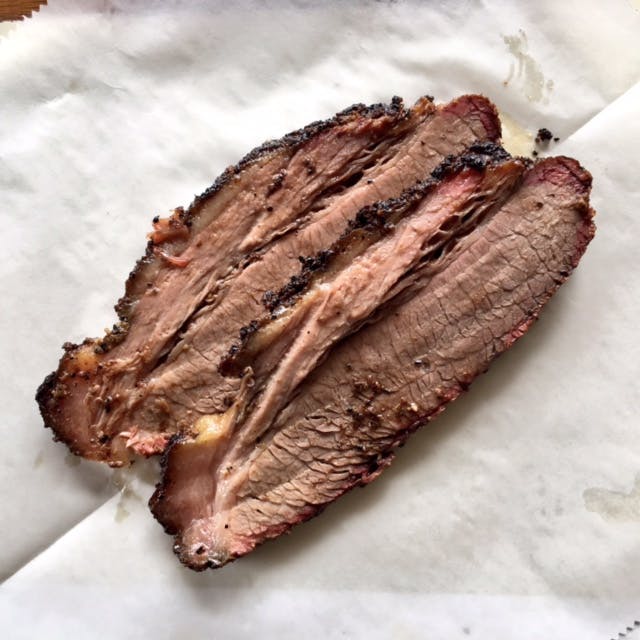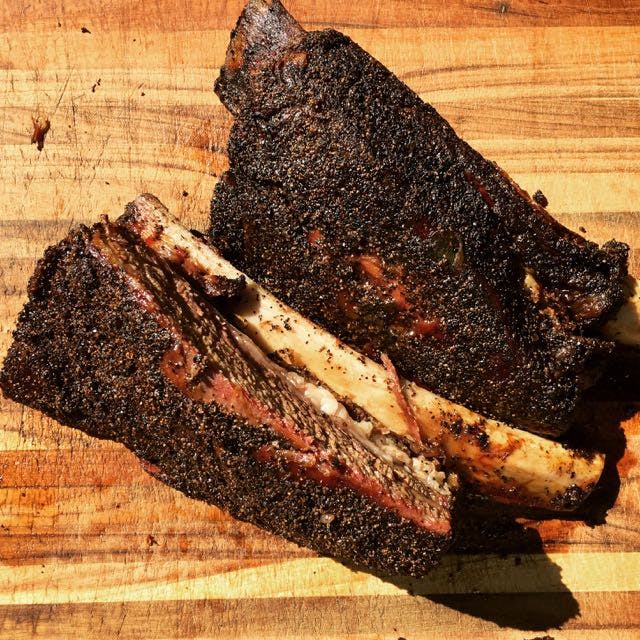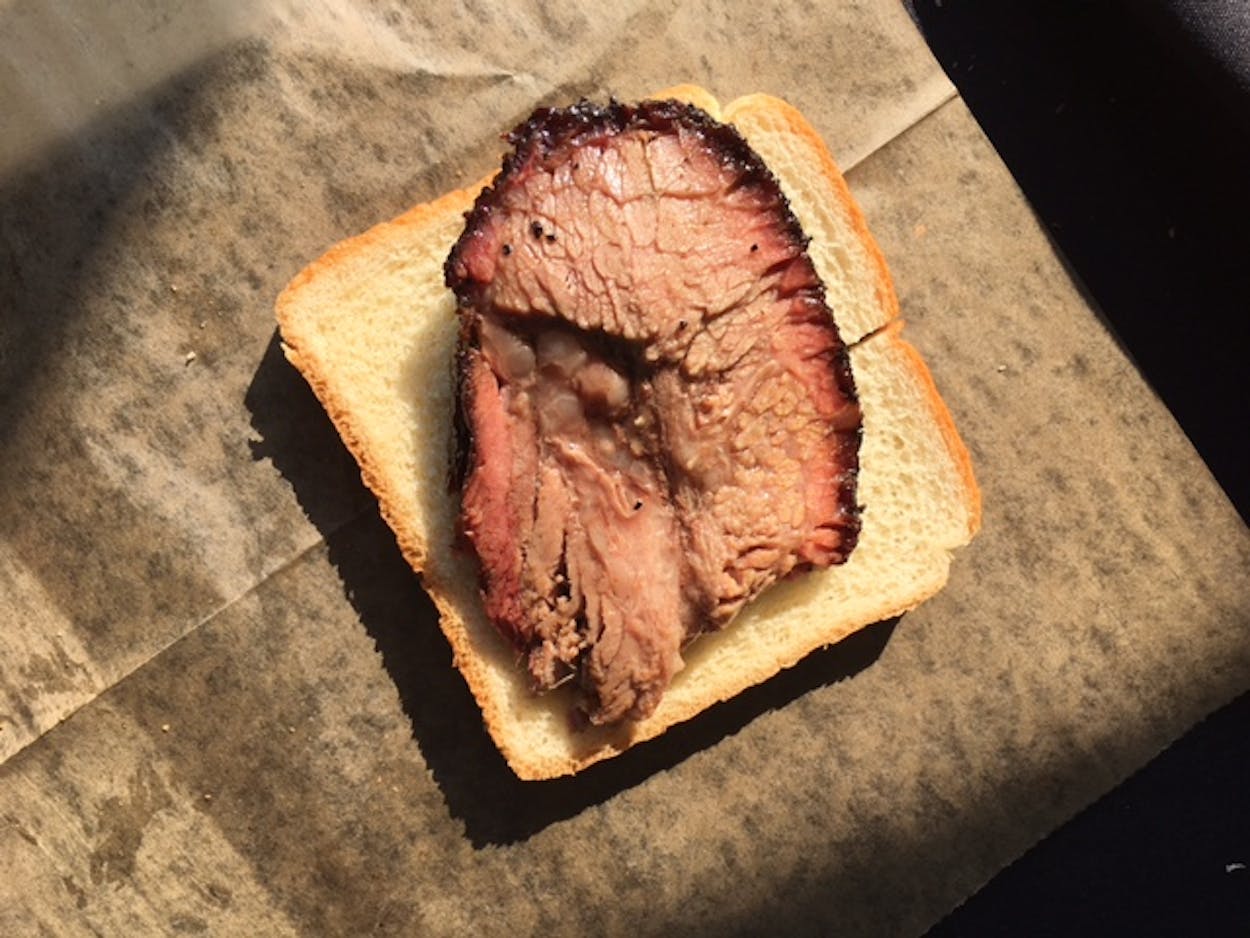There are plenty of pedantic conversations shared between barbecue devotees that are usually discussed loudly after a few beers. The latest to join the fray is Chris Fuhrmeister, an Atlanta-based food writer for Eater. He felt the best way to kick off Eater’s barbecue week was by clearing up what, exactly, constitutes barbecue. Fuhrmeister defines barbecue as “pork that’s slow-cooked with smoke.” Sorry about the brisket, beef ribs, lamb, turkey, chicken, and sausage you folks have been enjoying all over the country. It’s just not barbecue. While we’re at it, we should probably eliminate most of North Carolina’s pork too, since they cook their meat directly over wood coals rather than smoking it.
I’m often asked by food writing provocateurs to recommend opposing pitmasters who might repeat the tired brisket versus pork debate, but smokers’ hearts just aren’t in it. I was involved in a humorous version a few years back with my friend John Shelton Reed. He’s an author and an academic, and I write about barbecue. That made us perfect for a theatrical argument via email, but it’s nearly impossible to find a pitmaster across the country who is willing to seriously limit the definition of barbecue to their own menu. Congratulations to Fuhrmeister for finding an ally in John Currence, an esteemed chef in Oxford, Mississippi, who has been selling barbecue for almost three whole years. Without a hint of irony or sarcasm, they have together wiped barbecue off the map anywhere west of New Orleans and north of Tennessee.

I felt compelled to deliver the shocking news to several barbecue joints in Atlanta, the city that Fuhrmeister covers for Eater. It’s a city that has built an eclectic Georgia-rooted barbecue culture with influences from Texas to Korea. Joints like Fox Bros. Bar-B-Q, Sam’s BBQ 1, and Heirloom Market BBQ sell plenty of pig, but none are one-trick porkers. I called them all to see if they’d gotten the word from their hometown hero that most of their menu is no longer barbecue.
“Our menu is being switched as we speak,” Jonathan Fox, one of the Fox brothers assured me with a laugh. The Fox brothers hail from Fort Worth, so they brought a new perspective on smoked brisket to Atlanta when they began cooking there in 2004. They later opened a restaurant of their own in 2007. Now Fox Bros. Bar-B-Que cooks about five thousand pounds of brisket per week, and the brisket sandwich outsells the cheaper pulled pork sandwich. If only those beef-loving Atlanta diners knew they weren’t eating barbecue.
For his part, Jonathan doesn’t seem too concerned about the new barbecue definition. “To worry about one man and his opinions isn’t worth it,” he said. Fox has respect for pitmasters across the country, no matter which protein they prefer. “The people who cook the barbecue don’t sit around and debate about which regional cuisine is the best,” he said. “We listen to the customers who come in and eat our barbecue.” Fox promised to start the “make-non-barbecue-great-again movement,” as soon as we hung up.
Sam Hunt doesn’t cook barbecue in Atlanta, as far as I know. I think Fuhrmeister meant Sam “Huff” when he named Sam’s BBQ 1 the second best barbecue joint in the city. It’s an odd choice given that Huff’s menu—with all the brisket, turkey, and chicken—includes barely any real barbecue. “Oh my gosh, what am I gonna do?” Huff asked when I told him much of his barbecue had been relegated to just yummy meat. He hadn’t seen the article because he’d just gotten back from a trip to serve barbecue to the U.S. Senate in Washington, D.C., offering up beef short ribs, brisket, spare ribs, mac and cheese, and peach shortcake. Luckily, Huff crept out before a single complaint was lodged about his counterfeit barbecue.

As for Atlanta’s barbecue scene, Huff assured me that when it comes to cooking barbecue there is plenty of room for outside influences. “People who are serious about their craft realize that there’s something to be drawn from everywhere,” he said. Huff is a student of barbecue styles across the world, and is awaiting a delivery of pimento wood for his next batch of jerk chicken. He says he’s not alone in the exploration. “Everybody around here tries to find any good barbecue from anywhere around the country.”
“I take every region for what’s is worth,” said Cody Taylor of Heirloom Market BBQ. “It’s not about this region is better than another,” especially since much of the menu is influenced by his South Korean wife and partner Jiyeon Lee. The spicy Korean pork sandwich is one of their top sellers, but they also sell forty briskets a day. As far as the brisket versus pork debate: “It’s a waste of time to fight about it,” Taylor said, adding that though he’s a beef-loving Texan, “I find great joy in both.”
Huff summed up my own feelings best, saying that Fuhrmeister “is kind of a dinosaur.” Huff and I both thought we had gotten beyond the supposed need for these silly barbecue definitions, but I guess a younger version of me could relate to Fuhrmeister. Before I knew anything about barbecue outside of Texas (okay, before I actually knew anything about barbecue), I thought the right thing to do was claim that any barbecue made in Texas was better than any barbecue not made in Texas. I’ve traveled extensively, dined with pitmasters from every corner of the country, and learned a great deal about American barbecue. That education helped me appreciate meat cooked over wood, no matter if it once oinked or mooed. Fuhrmeister noted in his diatribe on brisket that he’d never been to Texas, and had eaten good brisket only once: from Texas native John Lewis at a barbecue event in New York. I might say Fuhrmeister needs to get out more, but before his next barbecue aphorism, evidently he just needs to eat around his own city more often. I bet that brisket will turn to barbecue before his very eyes.
- More About:
- Brisket








